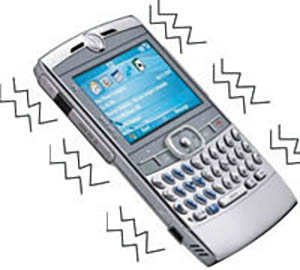
A number of years ago, I was attending a meeting with the director of an organization I was working for, along with the other heads of the program. The meeting was repeatedly interrupted by the incessant ringing of the director’s cell phone which he answered each time. After some time of this repeated annoyance I called the director from my cell phone and asked him when he might be available to meet with us.
In a similar vein, a friend of mine told me that he was once in a popular home-improvement store waiting to have a piece of wood to be cut. After waiting at the proper place for about twenty minutes, he called the store and asked to be connected to the lumber department. He asked them how long it would take for them to cut a piece of wood. The receptionist amicably replied that it would only take a minute and that he could come in at any time and they would be happy to help him. My friend then explained that he had been waiting for quite some time. A minute later an attendant arrived to cut the wood.
It’s a funny world that we live in. People often seem to have no qualms about making people wait endless amounts of time for them. But when their phone starts ringing, after one ring (or vibration/chime/note from some popular song) they answer their phone and launch into conversation.
It seems that nothing takes precedence over a phone call—nothing, that is, except for another phone call. With call waiting, suddenly the first phone call, which was so important a moment ago, is put on hold for the next phone call.
It was a big enough challenge when phones were attached to the wall, and even with cordless phones to follow us around the house. But today we have the ubiquitous cell phone. The head counselor of a large camp refers to his cell phone as his leash that connects him to his master. (His master is whoever is demanding his attention at the moment they decide to call him.) With cell phones we have the ability to disturb and disrupt anyone/anything no matter what we are doing.
What is it about phone calls that create a sense of urgency? Why do people feel the need to answer their phone even in the most inopportune places and at the most inappropriate times (e.g., during davening, or during a speech)?
I surmise that it is connected to our insatiable curiosity and fascination with the unknown. When the phone rings it could be anybody, and even if it is known who is calling, the caller can be calling about anything. A ringing phone is like reaching the dramatic climax of a suspense mystery. (If that is true, it follows that most phone calls leave us with some level of disappointment.)
If that is true, then not answering the phone immediately whenever it rings is an exercise in self-control, and we can all use improvement in that area.
Cell phones also remind us to thank God for Shabbos—the one day when we cannot answer our phones. I must confess that my cell phone has become such a part of me that every time someone moves a chair next to me on Shabbos, causing a faint vibration, I reach for my cell phone. Still, Shabbos provides a 25-hour reprieve, when we can actually talk to the people we are with, instead of talking to everyone besides the people we are with. Imagine that—in our day and age, talking to someone live!
Rabbi Dani Staum, LMSW, is the rabbi of Kehillat New Hempstead, as well as guidance counselor and fifth grade rebbe in ASHAR, and principal at Mesivta Ohr Naftoli of New Windsor, and division head at Camp Dora Golding. He also presents parenting classes based on the acclaimed Love and Logic methods. His email address is: [email protected]. His website is: www.stamtorah.info.










